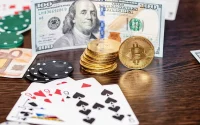7 Jaw-Dropping Facts About The Casino Industry
With their colourful flashing lights, and exciting noises, it’s no surprise that the casino industry is so popular, and you may think you know all there is to know about the casino gaming industry, but here are seven jaw-dropping facts that you may not know!
The first ever slot machine was not even played in a casino but was actually set up in a mechanic shop in San Francisco, for customers to play while their cars were being worked on. Charles Fey, the mechanic who owned the workshop was the one to invent the machine, way back in 1895 and it was called “Liberty Bell.”
If you are a gambling fan from Monte Carlo, you would think that you would just be able to pop across to the famous Monte Carlo Casino to scratch your itch, but it is illegal for citizens to gamble in the casino, and has been since Princess Caroline passed the law back in 1800. The silver lining is that the citizens are not required to pay income tax as the revenue from the casino covers everything.
In 1920, the first legal casino license was issued in Las Vegas, although you may be surprised to hear that it wasn’t a male casino mobster who received this but a woman called Mayme Stocker – a wife and mother.
It is a common misconception that oxygen is pumped into casinos to keep gamblers from getting tired and to keeping them gambling. This would be a dangerous fire hazard and entirely illegal!
Although penny slots are the cheapest to play, they are the most profitable in any casino. The small stake convinces players to spend more, and the prizes are also proportional to the machines, and so the payouts are rarely as enormous as other games.
The Nevada state prison had a casino inside it for 35 years, between 1932 and 1967, due to the popularity of the industry in the state. Inmates were able to play poker, blackjack and other card games, as well as bet on sports outcomes until it was closed down.
On the other side of the coin, casinos are illegal in Japan, however, as with all rules, there is a loophole. Casinos themselves are illegal but Pachinko Parlors, which house slot machine-like games in them, are legal. The Pachinko hands out small silver balls as prizes which can be swapped for prizes from toys to alcohol, or even “special prize” tokens which can be taken to state-regulated stores and exchanged for cash. A very round-about way of gambling, but still legal.

